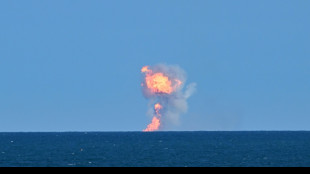
-
 Magritte painting nets auction record of $121 million
Magritte painting nets auction record of $121 million
-
Markets fluctuate as traders weigh geopolitical tensions

-
 Japanese, Koreans bottom of global love life survey
Japanese, Koreans bottom of global love life survey
-
Japan ramps up tech ambitions with $65 bn for AI, chips

-
 Taliban govt clearing 'un-Islamic' books from Afghanistan shelves
Taliban govt clearing 'un-Islamic' books from Afghanistan shelves
-
Asian markets struggle as traders weigh geopolitical tensions

-
 Iraq holds its first census in nearly 40 years
Iraq holds its first census in nearly 40 years
-
SpaceX fails to repeat Starship booster catch, as Trump watches on

-
 European powers, US seek to censure Iran at UN nuclear watchdog board
European powers, US seek to censure Iran at UN nuclear watchdog board
-
SpaceX fails to repeat Starship booster catch, as Trump looks on

-
 European stocks fall on Ukraine-Russia fears, US focused on earnings
European stocks fall on Ukraine-Russia fears, US focused on earnings
-
Trump names China hawk Howard Lutnick commerce secretary

-
 SpaceX set for Starship's next flight -- with Trump watching
SpaceX set for Starship's next flight -- with Trump watching
-
Top-selling daily French daily Ouest-France stops posting on X

-
 Russian invasion toll on environment $71 billion, Ukraine says
Russian invasion toll on environment $71 billion, Ukraine says
-
New Botswana leader eyes cannabis, sunshine to lift economy

-
 China's Xi urges 'strategic' ties in talks with Germany's Scholz
China's Xi urges 'strategic' ties in talks with Germany's Scholz
-
COP29 negotiators strive for deal after G20 'marching orders'

-
 Walmart lifts full-year forecast after strong Q3
Walmart lifts full-year forecast after strong Q3
-
Son of Norwegian princess arrested on suspicion of rape

-
 US lawmaker accuses Azerbaijan in near 'assault' at COP29
US lawmaker accuses Azerbaijan in near 'assault' at COP29
-
Spain royals to visit flood epicentre after chaotic trip: media

-
 French farmers step up protests against EU-Mercosur deal
French farmers step up protests against EU-Mercosur deal
-
Burst dike leaves Filipino farmers under water

-
 Markets rally after US bounce as Nvidia comes into focus
Markets rally after US bounce as Nvidia comes into focus
-
Crisis-hit Thyssenkrupp books another hefty annual loss

-
 Farmers descend on London to overturn inheritance tax change
Farmers descend on London to overturn inheritance tax change
-
Floods strike thousands of houses in northern Philippines

-
 SpaceX set for Starship's next flight, Trump expected to attend
SpaceX set for Starship's next flight, Trump expected to attend
-
Several children injured in car crash at central China school

-
 Urban mosquito sparks malaria surge in East Africa
Urban mosquito sparks malaria surge in East Africa
-
Many children injured after car crashes at central China school: state media

-
 Asian markets rally after US bounce as Nvidia comes into focus
Asian markets rally after US bounce as Nvidia comes into focus
-
Tens of thousands march in New Zealand Maori rights protest

-
 Five takeaways from the G20 summit in Rio
Five takeaways from the G20 summit in Rio
-
Parts of Great Barrier Reef suffer highest coral mortality on record

-
 Defiant Lebanese harvest olives in the shadow of war
Defiant Lebanese harvest olives in the shadow of war
-
Divided G20 fails to agree on climate, Ukraine

-
 Can the Trump-Musk 'bromance' last?
Can the Trump-Musk 'bromance' last?
-
US to call for Google to sell Chrome browser: report

-
 Trump expected to attend next Starship rocket launch: reports
Trump expected to attend next Starship rocket launch: reports
-
Stocks, dollar hesitant as traders brace for Nvidia earnings

-
 Biden in 'historic' pledge for poor nations ahead of Trump return
Biden in 'historic' pledge for poor nations ahead of Trump return
-
Tropical storm Sara kills four in Honduras and Nicaragua

-
 Spanish resort to ban new holiday flats in 43 neighbourhoods
Spanish resort to ban new holiday flats in 43 neighbourhoods
-
Phone documentary details Afghan women's struggle under Taliban govt

-
 G20 wrestles with wars, 'turbulence' in run-up to Trump
G20 wrestles with wars, 'turbulence' in run-up to Trump
-
Stocks, dollar hesitant as traders eye US rate outlook, Nvidia

-
 G20 wrestles with wars, climate in run-up to Trump
G20 wrestles with wars, climate in run-up to Trump
-
G20 host Brazil launches alliance to end 'scourge' of hunger


Deep ocean 'dark oxygen' find could rewrite Earth's history
In the total darkness of the depths of the Pacific Ocean, scientists have discovered oxygen being produced not by living organisms but by strange potato-shaped metallic lumps that give off almost as much electricity as AA batteries.
The surprise finding has many potential implications and could even require rethinking how life first began on Earth, the researchers behind a new study said on Monday.
It had been thought that only living things such as plants and algae were capable of producing oxygen via photosynthesis -- which requires sunlight.
But four kilometres (2.5 miles) below the surface of the Pacific Ocean, where no sunlight can reach, small mineral deposits called polymetallic nodules have been recorded making so-called dark oxygen for the first time.
The discovery was made in the Clarion-Clipperton Zone (CCZ), an abyssal plain stretching between Hawaii and Mexico, where mining companies have plans to start harvesting the nodules.
The lumpy nodules -- often called "batteries in a rock" -- are rich in metals such as cobalt, nickel, copper and manganese, which are all used in batteries, smartphones, wind turbines and solar panels.
The international team of scientists sent a small vessel to the floor of the CCZ aiming to find out how mining could impact the strange and little understood animals living where no light can reach.
- No sunlight required -
"We were trying to measure the rate of oxygen consumption by the seafloor," lead study author Andrew Sweetman of the Scottish Association for Marine Science (SAMS) told AFP.
To do so, they used a contraption called a benthic chamber which snatched up a bunch of sediment.
Normally, the amount of oxygen trapped in the chamber "decreases as its used up by organisms as they respire," Sweetman said.
But this time the opposite happened -- the amount of oxygen increased. This was not supposed to happen in complete darkness where there is no photosynthesis.
This was so shocking that the researchers initially thought their underwater sensors must have been on the blink.
So they brought up some nodules to their ship to repeat the test. Once again, the amount of oxygen increased.
They then noticed how the nodules were carrying a startling electric change.
On the surface of the nodules, the team "amazingly found voltages almost as high as are in an AA battery," Sweetman said.
This charge could split seawater into hydrogen and oxygen in a process called seawater electrolysis, the researchers said.
This chemical reaction occurs at around 1.5 volts -- around the charge of a AA battery.
- 'Exciting' -
SAMS director Nicholas Owens said it was "one of the most exciting findings in ocean science in recent times".
The discovery of oxygen produced outside of photosynthesis "requires us to rethink how the evolution of complex life on the planet might have originated," he said in a statement.
"The conventional view is that oxygen was first produced around three billion years ago by ancient microbes called cyanobacteria and there was a gradual development of complex life thereafter," Owens added.
But the team's discovery showed that "life could have started elsewhere than on land," Sweetman said.
"And, if the process is happening on our planet, could it be helping to generate oxygenated habitats on other ocean worlds such as Enceladus and Europa and providing the opportunity for life to exist?" Sweetman asked.
The study was published in the journal Nature Geoscience.
The work was partly funded by Canada's The Metals Company, which is aiming to start mining the nodules in the CCZ next year.
A.Zimmermann--CPN
